|
De Duitse schrijfster Gabriele Wohmann werd op 21 mei 1932 in Darmstadt geboren als Gabriele Guyot. Zie ook alle tags voor Gabriele Wohmann op dit blog.
Uit: Wachsfiguren
„- Ach so, Hase geht auch mit, sagte Lilia mit fallendem Ton.
- Natürlich geht das Häschen mit, rief Tante Else.
Hase stand in seiner gewohnten Abwehrhaltung mit so weit wie möglich weggedrehtem Gesicht. Er spürte Wärme, plötzlich dicht: Tante Else hatte sich neben ihn gekauert, ihre Arme waren zu eifrig.
- Heute geht es mit, nicht wahr, das Häschen, sagte Tante Else.
Es tat Hase leid um Lilia: sie hatte das neue Kleid an mit den roten und schwarzen Spritzern und sah so erwachsen aus. Sie konnte ihn nicht gebrauchen. Er sagte nichts, die Lippen ließen sich nicht bewegen, aber es tat ihm leid. Das wäre nicht der Sonntag, den sie mit diesem Kleid haben könnte.
Onkel Willi kam aus der Küche ins Vorzimmer und ließ die Tür offen, und der heiße Waschgeruch strömte herein. Onkel Willi roch festlich nach den Blumen und Kräutern seiner Rasierpaste. Sein speckiges Gesicht war nicht hart wie an Werktagen, sondern vom heißen Wasser aufgequollen und rot.
- Was macht der Hase für ein böses Gesicht, sagte er mit seiner Sonntagsstimme. Was macht er fürn böses Gesicht, wenn er mitgehn darf, he?
Hase gab sich Mühe, zu lächeln, aber das tat immer noch ein bißchen weh, fast zwei Jahre nach der Operation, die Oberlippe hatte nicht genug Platz, oder was war es sonst, auf jeden Fall fühlte er sich nicht wohl, wenn er lächeln mußte.
- Macht er ein böses Gesicht? rief Tante Else. Macht er denn eins?
- Na klar, sagte Onkel Willi, ich kann's nicht verstehn an so einem Tag, wo wir ihn mitnehmen.
Hase spürte, daß er jetzt etwas unternehmen mußte - nie war ein Frieden stabil genug. Er stieß eine Folge bettelnder Laute aus, hob die Hände, zwang sich, den Kopf ganz ihnen allen zuzukehren, das Gesicht zu heben, zu zeigen. Böses Gesicht. Lächeln, schlimmer als Schmerz, Unbehagen wie Krankheit. Kleines schreckliches Gesicht, schartig verzerrt und riesig rot geflügelt von den Ohrschalen. Es tat ihm leid für Lilia, auch ein bißchen für Tante Else, und sogar für Onkel Willi, weil er so weich und sonntäglich gestimmt war.
- Na laßt uns doch gehn, sagte Tante Else. Undankbare Kinder verdienen ja gar nicht, daß man sich so mit ihnen anstellt.
Es tat ihm leid um Lilias Kleid, weil alle Aufmerksamkeit unterwegs, im Omnibus und in der Vorhalle an der Kasse, wie immer auf ihn gezogen war. Häschen mit der Häschenscharte, Mäuschen mit den Fledermäuschenohren. Es tat ihm so leid für Lilia. Wie hieß er eigentlich wirklich? Hatte er einen Namen? Wie die andern: Willi, Else, Lilia. Kein Gesicht, keinen Namen. Er lief hinter den ändern her mit gesenktem Kopf, fühlte sich schläfrig vor Kummer“.
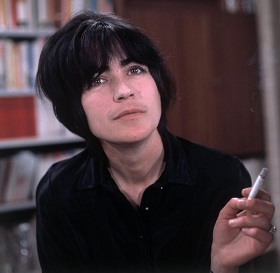
Gabriele Wohmann (21 mei 1932 – 22 juni 2015)
In 1969
De Amerikaanse schrijfster en journaliste Amy Waldman werd geboren op 21 mei 1969 in Los Angeles. Zie ook alle tags voor Amy Waldman op dit blog.
Uit: The Submission
« The concept was simple: a walled, rectangular garden guided by rigorous geometry. At the center would be a raised pavilion meant for contemplation. Two broad, perpendicular canals quartered the six-acre space. Pathways within each quadrant imposed a grid on the trees, both living and steel, that were studded in orchard-like rows. A white pe-rimeter wall, twenty-seven feet high, enclosed the entire space. The vic-tims would be listed on the wall's interior, their names patterned to mimic the geometric cladding of the destroyed buildings. The steel trees reincarnated the buildings even more literally: they would be made from their salvaged scraps. Four drawings showed the Garden across the seasons. Claire's favor-ite was the chiaroscuro of winter. A snow shroud over the ground; leaf-less living trees gone to pewter; cast-steel trees glinting with the rose light of late afternoon; the onyx surfaces of the canals shining like crossed swords. Black letters scored on the white wall. Beauty wasn't a crime, but there was more than beauty here. Even Ariana conceded that the spar-tan steel trees were an unexpected touch—reminders that a garden, for all its reliance on nature, was man-made, perfect for a city in which plas-tic bags wafted along with birds and air-conditioner runoff mixed in with rain. Their forms would look organic, but they would resist a garden's seasonal ebb and flow. "The Void is too dark for us," Claire said now, as she had before. Us: the families of the dead. Only she, on the jury, stood for Us. She loathed the Void, the other finalist, Ariana's favorite, and Claire was sure the other families would, too. There was nothing void-like about it. A tow-ering black granite rectangle, some twelve stories high, centered in a huge oval pool, it came off in the drawings as a great gash against the sky. The names of the dead were to be carved onto its surface, which would re-flect into the water below. It mimicked the Vietnam Veterans Memorial but, to Claire, missed the point. Such abstraction worked when humans could lay their hands on it, draw near enough to alter the scale. But the names on the Void couldn't be reached or even seen properly. The only advantage the design had was height. Claire worried that some of the families—so lingoistic, so literal-minded—might see the Garden as con-ceding territory to America's enemies, even if that territory was air. "Gardens are fetishes of the European bourgeoisie," Ariana said, pointing to the dining-room walls, which were papered with a panorama of lush trees through which tiny, formally dressed men and women strolled. Ariana herself was, as usual, dressed entirely in a shade of gruel that she had patented in homage to and ridicule of Yves Klein's brilliant blue. The mockery of pretension, Claire decided, could also be pretentious. 'Aristocratic fetishes," the jury's lone historian corrected.”

Amy Waldman (Los Angeles, 21 mei 1969)
De Amerikaanse schrijfster en scenariste Maria Keogh Semple werd geboren op 21 mei 1964 in Santa Monica, Californië. Zie ook alle tags voor Maria Semple op dit blog.
Uit: Today Will Be Different
“I walked up the steps, between the thickset columns, and into the impressive foyer of the Galer Street School. It was underlit and cathedral cool. Framed photos told the story of the building’s transformation from a home for wayward girls to a single-family residence (!) to today’s ruinously expensive private school.
A little about the building’s restoration. On the floor, in wood inlay, because strait is the gate and narrow is the path which leadeth unto life and few there be that find it, dated to 1906. One hundred and fifty rubber molds were created for the intricate plaster work. Colorado alabaster was cut paper-thin for the clerestory. The mosaic of Christ teaching children to pray required flying in a seventy-year-old craftsman from Ravenna, Italy. When the restoration began in 2012, the big mystery was what had happened to the brass Art Deco chandelier from the early photos. It was found by the guys blowtorching blackberry vines out of the basement. Large blindfolded pigs were lowered in on ropes to chew the chandelier free.
How could I possibly know this? As I entered, the chic architect in charge of the restoration happened to be leading a tour.
On my way to the administration offices: “Eleanor!”
I turned. For the past month, the conference room had become auction central, abuzz with parent volunteers.
“You’re just the person we need!” said the woman, a young mom.
Me? I mouthed, pointing, confused.”
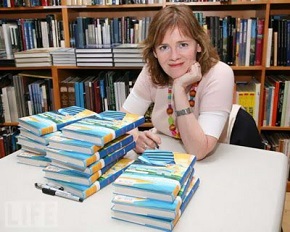
Maria Semple (Santa Monica, 21 mei 1964)
De Zwitserse schrijver Urs Widmer werd geboren op 21 mei 1938 in Basel. Zie ook alle tags voor Urs Widmer op dit blog.
Uit: TOP DOGS
„DEÉR Verstehe.
WRAGE Wir haben Partner in zweiundzwanzig Ländern und können unsere Klienten all over the world vermitteln. Nach allen Ländern der EU, Kenia, Mexiko, Japan. Just name it.
DEÉR Aha.
WRAGE Was alle Damen und Herren hier verbindet: Sie sind vom Verlust ihres Arbeitsplatzes betroffen und erwarten von uns eine optimale Unterstützung bei ihrer Karrierefortsetzung in einem anderen Unternehmen.
DEÉR nimmt die anderen wie neu wahr; als hätten sie die Lepra Die da, die stehen alle auf der Straße?
WRAGE Hier ist jeder in der gleichen Lage.
DEÉR Ja. Das kommt jetzt immer häufiger vor.
WRAGE Sehr gut! Was leistet unsere Organisation, und wie leistet sie es? Als wir vor zehn Jahren hier in der Schweiz unsere Tätigkeit aufnahmen, waren wir ein Nischenprodukt in einer intakten Arbeitswelt. Zwar war die Hochkonjunktur am Abklingen, darum ja unsere Anstrengungen, uns auch am Schweizer Markt zu positionieren, aber in den Köpfen des mittleren und höhern Kaders gab es noch kaum irgendwelche Gedanken an einen möglichen Verlust des Arbeitsplatzes.
DEÉR Ja, ja. Wir restrukturieren ja auch massiv. Grad nochmals tausendzweihundert Stellen abgebaut. Aber nicht in meinem Bereich. Das Catering ist stabil.
WRAGE Ja.
DEÉR Einzelne Fluktuationen allenfalls.
WRAGE Gut. - 1986 vermittelten wir ganze fünfzehn Herren! Waren bereits zwei Damen unter den Herren. Kleine Heiterkeit. Heute haben wir mehr als neunhundert Klientinnen und Klienten per annum, und wir haben unsre Tätigkeit auch auf nicht deutlich qualifizierte Arbeitsplätze aus dem untern Segment ausgedehnt. Wir bieten jetzt dreitägige Crash-Programme in Gruppen an, für eine erfolgreiche berufliche Neuorientierung auch im Low-salary-Bereich.
DEÉR Die da?”
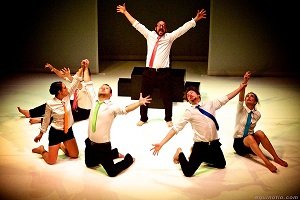
Urs Widmer (21 mei 1938 – 2 april 2014)
Scene uit een opvoering in Lugano in 2014
De Vlaamse dichter Emile Verhaeren werd geboren in Sint Amands op 21 mei 1855. Zie ook mijn blog van 21 mei 2010 en eveneens alle tags voor Emile Verhaeren op dit blog.
L'heure mauvaise
Depuis ces temps troublés d'adieux et de retours
Et de soudaine lassitude
D'être celui qui va, cerné de solitude,
Mes jours toujours plus lourds s'en vontroulant leur cours.
J'avais foi dans ma tête; elle était ma hantise.
Et mon entêtement - haine et splendeur - vermeil,
Où s'allumait l'intérieur soleil,
Dardait contre le bloc de roc de la bêtise.
De vivre ainsi hautement, j'avais
Muette joie à me sentir et seul et triste,
Ne croyant plus qu'à ma perdurance d'artiste
Et à l'oeuvre que je rêvais.
Celle qui se levait tranquille et douce et bonne
Et s'en allait par de simples chemins,
Vers les foyers humains,
Où l'on pardonne.
Ah! comme il fut plombant ce soir d'opacité,
Quand mon âme minée infiniment de doutes,
En tout à coup d'arbre à terre barra mes routes
Et lézarda, craquement noir, ma volonté.
A tout jamais mortes, mes fermetés brandies!
Mespoings? flasques; mes yeux? fanés; mes orgueils? serfs;
Mon sang coulait péniblement jusqu'à mes nerfs
Et comme des suçoirs gluaient mes maladies.
Et maintenant que je m'en vais vers le hasard...
Dites, le voeu qu'en un lointain de sépulture,
Comme un marbre brûlé de gloire et de torture,
Rouge éternellement se crispera mon art!
Des soirs
I
Sur mes livres éteints, où comme en un miroir
J'ai reflété mon coeur lassé, mon coeur du soir,
Après un jour vécu sans gloire et sans vaillance,
Lampes immobiles, larmez, dans le silence,
Vos feux pour le sommeil qui vient, torpidement,
Clore mes yeux fanés et mon attristement;
Lampes, brûlez, durant des heures et des heures
Encor, inutiles pour tous, mais les meilleures
Pour le rêve veiller - dont mon esprit, hélas!
Au clair sonnant matin ne se souviendra pas.
II
Sous les vitres du hall nitreux que le froid fore
Et vrille et que de mats brouillards baignent de vair,
Un soir, en tout à coup de gel, s'ouvre l'hiver,
Dans le foyer, fourbi de naphte et de phosphore
Qui brûle: et le charbon pointu se mousse d'or
Et le posthume été dans l'or se réitère;
Il émeraude un bol, il enturquoise un verre
Et multiplie en chatons d'or son âme encor.
Par à travers ce feu qui le détruit, sa joie
Est de faire des fleurs parmi les lustres, vivre!
Et d'allumer sa mort comme une fête. Au loin,
Lorsque tonne l'autonne et que le vent disjoint
On serre en noeud ses poings et que gratte le givre...
O cette mort que l'on torture et qui flamboie!
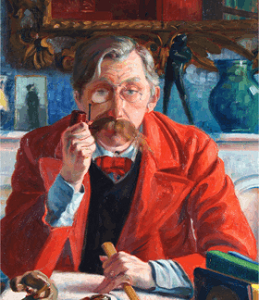
Emile Verhaeren (21 mei 1855 - 27 november 1916)
Portret door Georges Tribout, 1907
De Amerikaanse dichter Robert Creeley werd geboren op 21 mei 1926 in Arlington, Massachusetts. Zie ook alle tags voor Robert Creeley op dit blog.
The Whip
I spent a night turning in bed,
my love was a feather, a flat
sleeping thing. She was
very white
and quiet, and above us on
the roof, there was another woman I
also loved, had
addressed myself to in
a fit she
returned. That
encompasses it. But now I was
lonely, I yelled,
but what is that? Ugh,
she said, beside me, she put
her hand on
my back, for which act
I think to say this
wrongly.
After Lorca
for M. Marti
The church is a business, and the rich
are the business men.
When they pull on the bells, the
poor come piling in and when a poor man dies, he has a
wooden
cross, and they rush through the ceremony.
But when a rich man dies, they
drag out the Sacrament
and a golden Cross, and go doucement, doucement
to the cemetery.
And the poor love it
and think it's crazy.
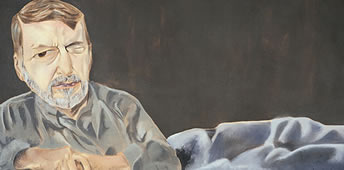
Robert Creeley (21 mei 1926 – 30 maart 2005)
Portret door Francesco Clemente, 2001
De Engelse dichter Alexander Pope werd geboren in Londen op 21 mei 1688. Zie ook mijn blog van 21 mei 2010 en eveneens alle tags voor Alexander Pope op dit blog
The Rape of the Lock: Canto 1 (Fragment)
The graver prude sinks downward to a Gnome,
In search of mischief still on earth to roam.
The light coquettes in Sylphs aloft repair,
And sport and flutter in the fields of air.
Know further yet; whoever fair and chaste
Rejects mankind, is by some sylph embrac'd:
For spirits, freed from mortal laws, with ease
Assume what sexes and what shapes they please.
What guards the purity of melting maids,
In courtly balls, and midnight masquerades,
Safe from the treach'rous friend, the daring spark,
The glance by day, the whisper in the dark,
When kind occasion prompts their warm desires,
When music softens, and when dancing fires?
'Tis but their sylph, the wise celestials know,
Though honour is the word with men below.
Some nymphs there are, too conscious of their face,
For life predestin'd to the gnomes' embrace.
These swell their prospects and exalt their pride,
When offers are disdain'd, and love denied:
Then gay ideas crowd the vacant brain,
While peers, and dukes, and all their sweeping train,
And garters, stars, and coronets appear,
And in soft sounds 'Your Grace' salutes their ear.
'Tis these that early taint the female soul,
Instruct the eyes of young coquettes to roll,
Teach infant cheeks a bidden blush to know,
And little hearts to flutter at a beau.

Alexander Pope (21 mei 1688 – 30 mei 1744)
Portret door Jean-Baptiste van Loo, ca. 1742
De Roemeense dichter en schrijver Tudor Arghezi werd geboren op 21 mei 1880 in Boekarest. Zie ook alle tags voor Tudor Arghezi op dit blog.
Inscription On A Glass
Round crystal on velvet shade,
Serenity at my heart,
I created myself from sky-waters,
Froze under icicles of light.
I am born virgin in my place
Unceasingly as dew-pebbles,
Sparkling in my depths;
The more the less I hold.
But you won't know what and how many
Sources have filtered noiselessly through me.
And you don't know how many warm lips
Have sipped at my flashing lip.
They are here now in the air like leaves
When you try my untasted freshness;
Your mouth sipping new drops
Will kiss shadow lips in flight.
Morgenstimmung
Your song filtered into me
One afternoon
When the window of my barred soul
Flew open in the wind
Without my knowing I heard you singing.
Your song has filled the whole building
The drawers boxes rugs
Like sonorous lavender.
Look The bars have come loose
And the monastery lies open before me.
And it might perhaps have been nothing
Had you not undermined me
With your song and your little finger
That touches the blackbirds on the keys
Your whole being close by.
With a roar clouds collapse
Into the room of the closed universe.
The storm brought cranes Bees leaves...
My beams Are flimsy as petals.
Why did you sing?
Why did I hear you?
We have crumbled into completeness
Cloudlike under the skies.
I came from above You from below.
Vertaald door Michael Impey and Brian Swann
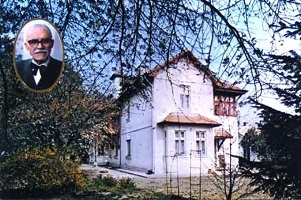
Tudor Arghezi (21 mei 1880 – 14 juli 1967)
Tudor Arghezi’s oude woonhuis, nu museum in Boekarest
De Vlaamse schrijfster Suzanne Lilar werd geboren als Suzanne Verbist in Gent op 21 mei 1901. Zie ook alle tags voor Suzanne Lilar op dit blog.
Uit: Une enfance gantoise
« Mais qu'était-ce que ce néerlandais auquel on reprochait en même temps de n'être qu'un grossier dialecte et d'avoir été créé artificiellement par une clique d'intellectuels, dont tantôt on blâmait la mollesse (la « bouillie flamande »), tantôt la rudesse (le parler, c'était « croasser », « mâcher des clous », « broyer des cailloux ») ? Un langage dont les lettres de noblesse remontaient au Mie siècle et qui avait été celui de nos trouvères, de nos satiriques, de nos grands poètes mystiques et métaphysiques, Hadewijch, Beatrix, Ruusbroec. C'était la langue de Rubens, celle de sa correspondance (sauf le cas où son destinataire ne l'entendant point, le peintre usait de l'italien ou du français), celle de la chanson populaire miraculeusement conservée, celle enfin qu'en même temps que le français on apprenait en classe - à condition bien entendu de s'y prêter. Car dans certaines écoles, notamment l'Institut de Kerckhove fréquenté par les filles de la grande bourgeoisie, une consigne circulait à l'intention des nouvelles : « On ne fait pas le devoir de flamand. » Humiliée mais résignée la maîtresse de néerlandais s'inclinait. Bannie des salons, proscrite des universités et des prétoires, si peu tolérée au Parlement qu'on faisait le vide autour des députés qui avaient l'inconvenance de s'en servir, cette langue bafouée savait se ménager des revanches. Soit qu'elle fût plus que le français propice à l'effusion, soit que les remous de l'émotion fissent affleurer quelque mémoire ancestrale, on la voyait remonter dans les gros mots de la colère ou les diminutifs de la tendresse et même, plus tragiquement, dans la débâcle de l'agonie. Ainsi arrivait-il qu'ayant vécu en français, l'on mourût en flamand. Ce fut le cas de ma mère qui, peut-être pour l'avoir renié durant sa vie, se remit à parler flamand sur son lit de mort, avec précipitation et comme pour rattraper le temps perdu. Il faut dire qu'en reniant le néerlandais, Maman rompait avec une tradition familiale de bilinguisme, ses parents et grands-parents ayant servi avec équanimité les deux langues (ainsi qu'en témoignent divers documents et mémoires d'Edmond De Busscher, mon arrière-grand-père l'archiviste). En même temps - par dévotion amoureuse à un mari que quelques années de jeunesse vécues en France avaient orienté définitivement vers ce côté -, elle trahissait un peu son père qui se flattait de descendre des Artevelde, adversaires farouches du parti français. »
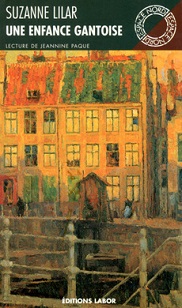
Suzanne Lilar (21 mei 1901 - 12 december 1992)
Cover
|



